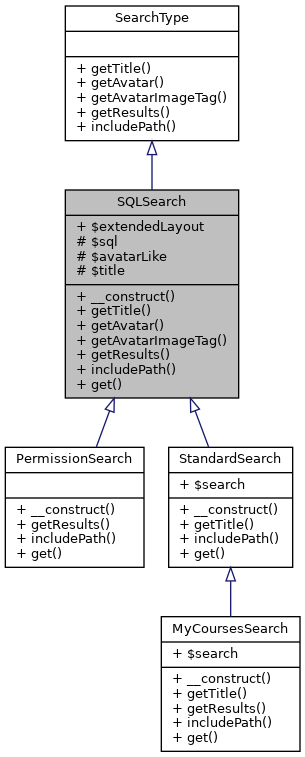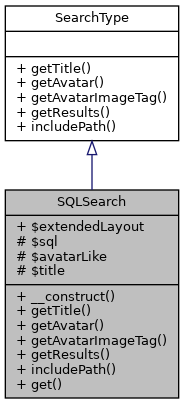

Public Member Functions | |
| __construct ($query, $title="", $avatarLike="") | |
| getTitle () | |
| getAvatar ($id) | |
| getAvatarImageTag ($id, $size=Avatar::SMALL, $options=array()) | |
| getResults ($input, $contextual_data=array(), $limit=PHP_INT_MAX, $offset=0) | |
| includePath () | |
 Public Member Functions inherited from SearchType Public Member Functions inherited from SearchType | |
| getTitle () | |
| getAvatar ($id) | |
| getAvatarImageTag ($id) | |
| getResults ($keyword, $contextual_data=array(), $limit=PHP_INT_MAX, $offset=0) | |
| includePath () | |
Static Public Member Functions | |
| static | get ($query, $title="", $avatarLike="") |
Data Fields | |
| $extendedLayout = false | |
Protected Attributes | |
| $sql | |
| $avatarLike | |
| $title | |
Detailed Description
Class of type SearchType used for searches with QuickSearch (lib/classes/QuickSearch.class.php). You can search with a sql-syntax in the database. You just need to give in a query like for a PDB-prepare statement and at least the variable ":input" in the query (the :input will be replaced with the input of the QuickSearch userinput. [code] $search = new SQLSearch("SELECT username, Nachname " "FROM auth_user_md5 " . "WHERE Nachname LIKE :input ", _("Nachname suchen"), "username"); [/code]
Constructor & Destructor Documentation
◆ __construct()
| __construct | ( | $query, | |
$title = "", |
|||
$avatarLike = "" |
|||
| ) |
- Parameters
-
string $query SQL with at least ":input" as parameter string $title string $avatarLike in this search. array("input_name" => "placeholder_in_sql_query")
- Returns
- void
Reimplemented in MyCoursesSearch.
Member Function Documentation
◆ get()
|
static |
returns an object of type SQLSearch with parameters to constructor
- Parameters
-
string $query SQL with at least ":input" as parameter string $title string $avatarLike in this search. array("input_name" => "placeholder_in_sql_query")
- Returns
- SQLSearch
Reimplemented in MyCoursesSearch.
◆ getAvatar()
| getAvatar | ( | $id | ) |
returns an adress of the avatar of the searched item (if avatar enabled)
- Parameters
-
string $id id of the item which can be username, user_id, Seminar_id or Institut_id string $size enum(NORMAL, SMALL, MEDIUM): size of the avatar-image
- Returns
- string adress of an image
Reimplemented from SearchType.

◆ getAvatarImageTag()
| getAvatarImageTag | ( | $id, | |
$size = Avatar::SMALL, |
|||
$options = array() |
|||
| ) |
returns an html tag of the image of the searched item (if avatar enabled)
- Parameters
-
string $id id of the item which can be username, user_id, Seminar_id or Institut_id constant $size enum(NORMAL, SMALL, MEDIUM): size of the avatar
- Returns
- string like "<img src="...avatar.jpg" ... >"

◆ getResults()
| getResults | ( | $input, | |
$contextual_data = array(), |
|||
$limit = PHP_INT_MAX, |
|||
$offset = 0 |
|||
| ) |
returns the results of a search Use the contextual_data variable to send more variables than just the input to the SQL. QuickSearch for example sends all other variables of the same <form>-tag here.
- Parameters
-
string $input the search-word(s) array $contextual_data an associative array with more variables int $limit maximum number of results (default: all) int $offset return results starting from this row (default: 0)
- Returns
- array array(array(), ...)
Reimplemented from SearchType.
Reimplemented in MyCoursesSearch, and PermissionSearch.

◆ getTitle()
| getTitle | ( | ) |
returns the title/description of the searchfield
- Returns
- string title/description
Reimplemented from SearchType.
Reimplemented in MyCoursesSearch, and StandardSearch.
◆ includePath()
| includePath | ( | ) |
A very simple overwrite of the same method from SearchType class. returns the absolute path to this class for autoincluding this class.
- Returns
- string path to this class
Reimplemented from SearchType.
Reimplemented in MyCoursesSearch, PermissionSearch, and StandardSearch.
Field Documentation
◆ $avatarLike
|
protected |
◆ $extendedLayout
| $extendedLayout = false |
◆ $sql
|
protected |
◆ $title
|
protected |
The documentation for this class was generated from the following file:
- lib/classes/searchtypes/SQLSearch.class.php
